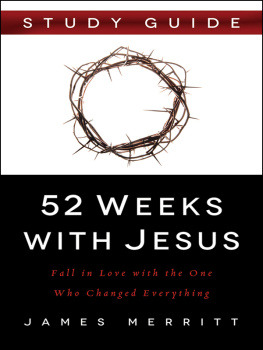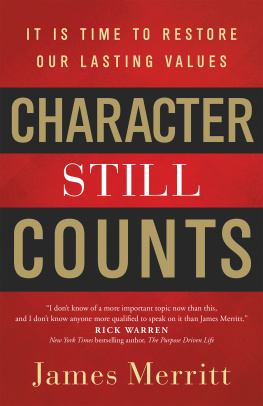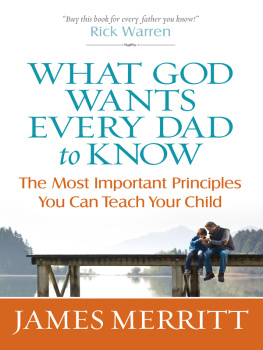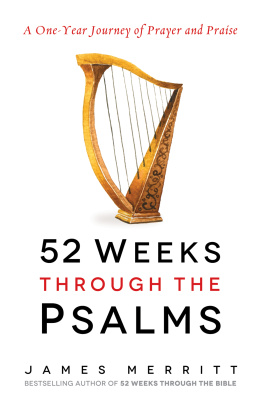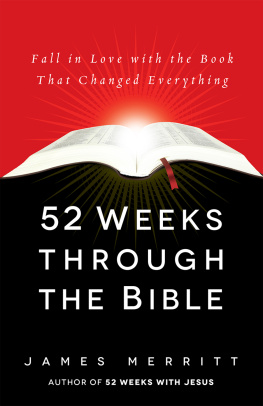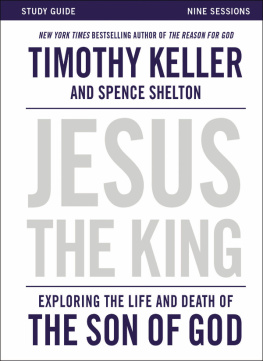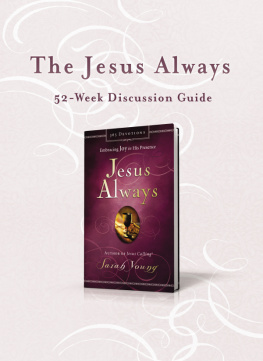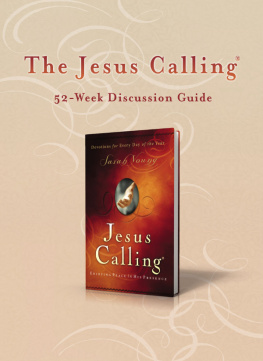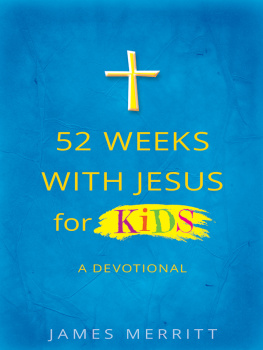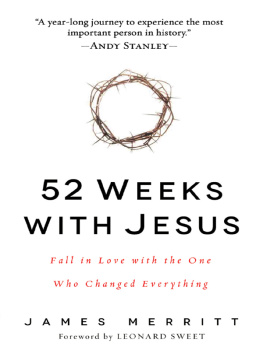Turn Your Eyes upon Jesus
1. Read Matthew 13:53-57.
a. How did Jesus offend the people of his hometown? What in particular upset them?
b. How does the ordinariness of Jesus still offend people? Why do you think God didnt make Jesus more like a Marvel comics character?
c. In what ways was Jesus just like you ? How does this make you feel? Explain.
2. Read Revelation 13:8.
a. The Lamb mentioned in this verse is Jesus Christ (see Revelation 5:5-13). What does it mean that this Lamb was slain from the creation of the world? What does this say about Gods plan for the world?
b. Why would Jesus have a book of life?
c. Compare this verse with Ephesians 2:10. What similarities in concept do you see between the two verses? How could these thoughts be important to you as you go about your daily life?
Reflect on the Book
1. The next time your world seems to be spinning out of control and you wonder if someone has a hand on the throttle of the train, just read the first verse of the first chapter of the first book of the New Testament. Youll be reminded that Jesuss tree is your tree and that God is in control.
a. Describe a time your own world seemed to be spinning out of control.
b. How does God intend for the genealogy of Jesus to encourage you during uncertain times? Does it? Explain.
2. God can overcome whatever troubles are behind you to achieve the purpose he has set before you.
a. What troubles behind you do you still need to overcome?
b. What do you think Gods purpose for you might be? Describe it.
3. Jesus was just like usborn with a past and a historyand we have been made to become like him. God wants you to be a masterpiece of his grace by living for his glory and expressing his goodness to others.
a. Why is it important that Jesus was just like us, with a specific past and a history? Why is it important to you that Jesus was just like us?
b. How can you live for Gods glory, right where you are? How can you express Gods goodness to others? What can you do to help them see God through you?
Put It into Practice
1. Spend a little time investigating your own heritage. What does your genealogy tell you about who you are and where you come from?
2. Who in your sphere of influence most needs to see Gods glory right now? What can you do this week to help this person see Gods glory?
Turn Your Eyes upon Jesus
1. Read Isaiah 53:1-3.
a. What does it mean that Jesus grew up like a tender shoot and like a root out of dry ground (v. 2 NIV )? At the time Jesus was born, what kind of status did Israel enjoy? What kind of status did the family line of David enjoy at that time?
b. Would Jesuss physical features have attracted much attention (v. 2)? Would we probably have called Jesus handsome? Explain. Why do you think Isaiah would mention this detail?
c. How would most men respond to Jesus, according to Isaiahs prophecy (v. 3)? In what way would Jesus be a man of sorrows? In what way would he be familiar with suffering? Why would men hide their faces from him? In what ways is Jesus still not esteemed today?
d. Why do you think God gave Jesus the sort of body he had? Why not give him movie star looks and a throng of fans?
2. Read John 9:24-34.
a. How did the religious leaders want the formerly blind man to give glory to God (v. 24)? What were they asking him to do? Why did they want him to do this?
b. What one piece of testimony was the man willing to give (v. 25)?
c. Why did the religious leaders begin to insult the man (vv. 26-28)?
d. What comparison did the leaders make between Moses and Jesus? What is significant about the comparison?
e. What conclusion did the man make on his own (vv. 30-33)?
f. What price did the man have to pay for choosing to speak the truth (v. 34)? Why do you think he was willing to pay it? Would you have been willing to pay it? Explain.
Reflect on the Book
1. Jesuss genealogy in the Gospels includes five females. This sets the tone for justice and equality between the genders that is reinforced throughout Christs ministry.
a. How does the inclusion of five females in the genealogy of Jesus set the tone for justice and equality?
b. How did the rest of Christs ministry continue to set this tone?
2. God seems to be saying that no one is beyond his gracea message that Jesus reiterates repeatedly.
a. Is it really true that no one is beyond Gods grace? Explain. Describe someone in your own experience who appeared to be beyond Gods grace, but wasnt.
b. In what ways does Jesus reiterate that no one is beyond his grace? Does it ever feel to you as though you are beyond Gods grace? Explain.
3. God is reminding us that he can do for us what we cannot do for ourselves: pick up broken pieces and put them together, take broken lives and make them whole, gather broken hopes and make them reality.
a. What broken pieces of your own life has God, through Christ, put back together?
b. What hopes is God in the process of making reality for you?
Put It into Practice
1. Get alone somewhere and make a list of all the ways you feel like a misfit. Then spend some time praying over that list, thanking God that he accepts you just as he accepts Jesus.
2. How has God been showing his grace in your life over the past week? Over the past month? Over the past year? Give him praise by telling someone else what youve watched him do in your life.
Turn Your Eyes upon Jesus
1. Compare Isaiah 7:14 with Matthew 1:18-25 and Luke 1:26-38.
a. How was Matthew careful to say that Mary was a virgin? Why was he so careful to say it?
b. What language did Luke use to convey that Mary had not had sexual relations before she became pregnant? Why did he explain this was important to know?
c. What would you say to someone who claimed the virgin birth couldnt be very important, since the apostle Paul never once mentioned it?
2. Read Ephesians 2:11-22.
a. What was true of all non-Jews before the coming of Christ (vv. 11-12)?
b. How did Christ change the Gentiles ability to have a relationship with God? (v. 13) How did Christ make this change possible?
c. In what way is Christ our peace (v. 14)?
d. What did Jesus intend to create through his death on the cross (vv. 15-16)?
e. How do we see the Trinity working together on our behalf (v. 18)? How does this truth affect you personally?
f. How has your spiritual heritage changed because of what Christ did for you (vv. 19-22)? Name all the benefits you see.
Reflect on the Book
1. The central point of Lukes genealogy is the fact that it ends in God.
a. Why is it important that Lukes genealogy ends in God?
b. In what way is it important to you that Lukes genealogy ends in God?
2. Christ, the Son of God/ Became a son of Adam/ That we, sons of Adam,/ Might become sons of God.
a. What does it mean that Jesus became a son of Adam? Why is it remarkable that sons of Adam could become sons of God?
b. Why did Jesus have to become a son of Adam in order to make it possible for us to become sons of God?
3. Just as God used two ordinary women named Ruth and Mary to make a lasting impact on the world, so God can use you to make a lasting impression on others by your living for him and loving him and doing his will.
a. How do you think God might want to use you to make a lasting impression on others?
b. In what ways is it especially hard for you to live for God? In what ways do you find it easy to love him? How might it be especially challenging to do his will this week? How will you meet that challenge?
Put It into Practice
1. What kind of Christian heritage do you want to leave to your family? What can you do, starting today, to begin leaving that kind of heritage?
Next page
